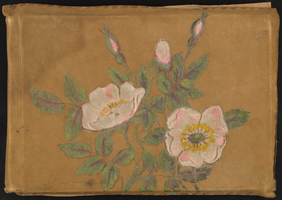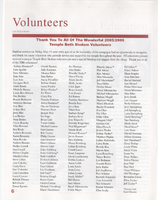Search the Special Collections and Archives Portal
Search Results

Transcript of interview with Susan Jones Watson by Claytee White, February 20, 2013
Date
Archival Collection
Description
A resident of Southern Nevada from the age of three, Susan Watson shares her memories of growing up and living in Las Vegas. After a year in Boulder City, Susan's father bought an old army barrack and converted it to a home in North Las Vegas; Susan remembers playing in the desert with her siblings and attending elementary and middle school before starting at Rancho High. Watching her mother design costumes for Strip performers and beautiful dresses for her own high school dances no doubt helped Susan develop her own sense of taste and style - something that she would put to good use over many years as an interior designer. Before that though, Susan shares her memories of what life was like in the Las Vegas of the 1950s and 1960s: cruising Fremont Street; movie nights; after-school work; favorite teachers; lunches on the lawn; and dance club. All combine to paint a vivid picture of a smaller town and a simpler time in the Las Vegas valley.
Text

Meeting minutes for Consolidated Student Senate, University of Nevada, Las Vegas, December 05, 1978
Date
Archival Collection
Description
Text

Meeting minutes for Consolidated Student Senate, University of Nevada, Las Vegas, June 14, 1983
Date
Archival Collection
Description
Text

Scrapbook of poetry and other clippings
Date
Archival Collection
Description
Scrapbook of poetry and other clippings
Mixed Content

Transcript of interview with Jackie MacFarlane by Claytee White, February 4, 2010
Date
Archival Collection
Description
Jacqueline "Jackie" Tilman MacFarlane was born in her grandmother's Las Vegas home at H Street and Clark Ave. Her father John Franklin Tilman was a construction worker at Boulder Dam (now Hoover) in early 1930s. Jackie recalls her family having to move several times the Great Depression and living in rural Nevada. Eventually the family came back to reside in Las Vegas. After graduating from high school, she took a waitress job at the Spot Cafe (Main & Charleston) and then at the Askew Drive-In. It was there that she met her future husband, David MacFarlane, an Air Force cadet. David continued to work at Nellis Air force Base as a civilian until he retired in 1987. Jackie describes raising her children in Fair Circle neighborhood during the 1950s and 1960s; a time when Las Vegas was just a "small town of 50,000." She felt safe and always found work in the casinos. Her work career included being a change girl at the Mint of Fremont St. and working as the front office cashier at the Desert Inn and then working at the Sands Hotel and Casino. Eventually she became a night auditor at Sands Hotel and Casino and then at Sahara Hotel and Casino from 1970-1977. She remembers working nightshift, coming home to get the kids and husband off to school and work. After leaving Sahara, she began selling Vanda cosmetics as a home business, something she still does today.
Text

Catherine Cortez Masto oral history interview: transcript
Date
Archival Collection
Description
Oral history interview with Catherine Cortez Masto conducted by Claytee D. White on August 10, 2018 for the Latinx Voices of Southern Nevada Oral History Project. Catherine Cortez Masto grew up in Las Vegas near where the town ended and the desert began, which at that time was near Decatur and Pennwood. She grew up playing in the streets and riding horses and motor bikes with girlfriends and cousins. Her father, Manny Cortez, began as a valet at the Dunes before entering politics. He served 16 years on the County Commission and then 13 years as the chief of the Las Vegas Convention and Visitors Authority. As the head of the LVCVA, Manny oversaw campaigns to increase tourism, enlarge McCarran International Airport, improve taxicab service, and served as a visionary for the entire region. Catherine followed in her father's footsteps while being her own woman and making her own mark on the region. She attended college at UNR and law school at Gonzaga University School of Law. After a clerkship, she worked for a small local Las Vegas firm for 4 - 5 years, then moved to the governor's and then served two terms as Nevada's Attorney General. Currently she's in the US Senate with committee assignments that include Banking, Housing and Urban Affairs; Energy and Natural Resources; Commerce, Science, and Transportation; Rules and Administration; Indian Affairs, and the Committee on Aging. Subjects discussed include: Dunes, Manny Cortez, County Commission, LVCVA, Judge Carl Christensen, Judge Mendoza, Taxi Authority, Tourism, and Mike O'Callaghan.
Text

Sergio "Checko" Salgado oral history interview: transcript
Date
Archival Collection
Description
Oral history interview with Sergio "Checko" Salgado conducted by Laurents Bañuelos-Benitez, Barbara Tabach, Elsa Lopez, and Monserrath Hernández on June 4, 2019 for the Latinx Voices of Southern Nevada Oral History Project. Checko talks about his personal history that led him to pursue journalism and photography. He discusses his education and employment working in art galleries in Denver, Colorado and Las Vegas, Nevada and the various art exhibitions he has designed including in the Marjorie Barrick Museum at the University of Nevada, Las Vegas and in the Reynolds Senate Building in Washington, D.C.
Text
Olivia Diaz (City of Las Vegas Councilwoman) oral history interview conducted by Magdalena Martinez: transcript
Date
Archival Collection
Description
From the Lincy Institute "Perspectives from the COVID-19 Pandemic" Oral History Project (MS-01178) -- Elected official interviews file.
Text

Brittany Castrejon oral history interview: transcript
Date
Archival Collection
Description
Oral history interview with Brittany Castrejon conducted by Claytee D. White and Barbara Tabach on November 9, 2017 for the Remembering 1 October Oral History Project. In this interview, Brittany Castrejon details her experiences during the evening of the 2017 mass shooting in Las Vegas, Nevada. She describes the Route 91 Harvest Festival set-up and details the events of that night, which she experienced alongside her 14-year-old cousin and a few friends. Castrejon tells her story of trying to find safety from the chaos during the entire ordeal, eventually finding refuge for the remainder of the night at the Tropicana hotel. She ends the interview by discussing her adjustment to life after the shooting and her post-traumatic stress disorder, as well as what she has learned from the experience.
Text

